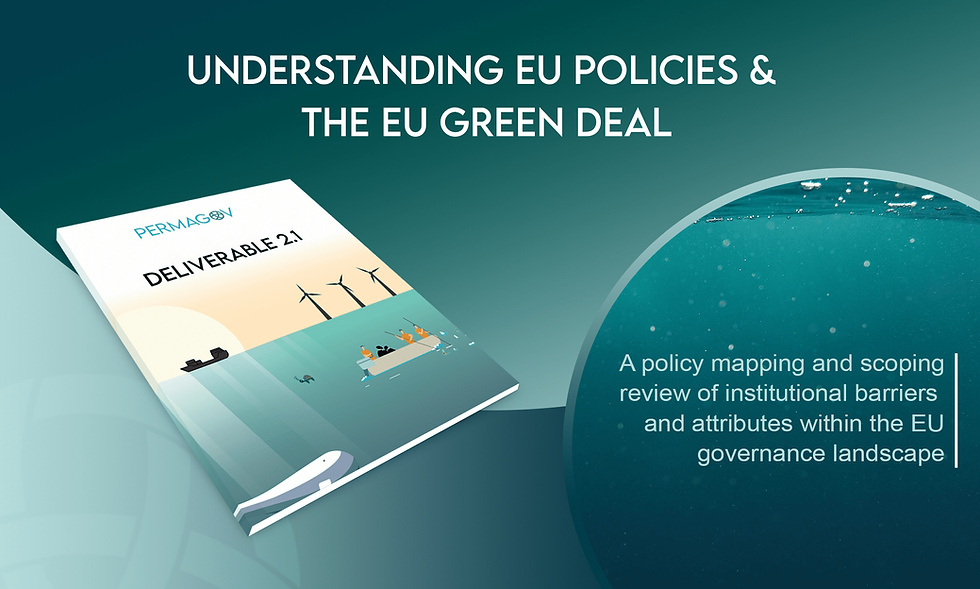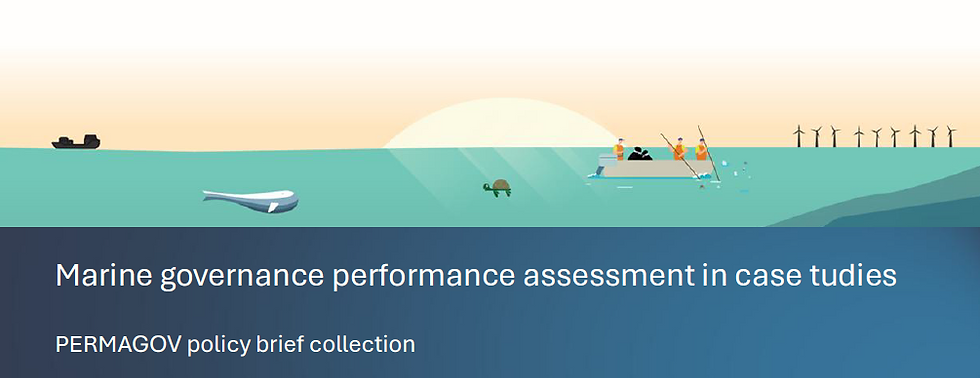A Report On The Interplay Between EU Policies and Marine Governance In The Context Of The EU Green Deal
- pavel874
- Mar 29, 2024
- 3 min read
Updated: May 6, 2024
PERMAGOV mapped 44 marine related policies to understand how they support or hinder progress towards the goals set out in the European Green Deal. A scoping of institutional barriers was conducted as part of this exercise to provide insights into potential challenges in policy design and implementation. The results provide a valuable contribution to the broader discourse on how to improve marine governance performance.

The European Green Deal (EGD) emerged in 2019 and aims to transform the EU into a modern, resource-efficient and competitive economy. EGD establishes the EU’s long-term vision for 2050 to ensure zero net emissions of greenhouse gases, economic growth that is decoupled from resource use, and no person and no place is left behind. EGD is therefore implemented in response to the triple planetary crisis of climate change, pollution, and biodiversity loss.
However, meeting this ambition requires that EU governance is considered from a new perspective, one that merges previously established and stand-alone policy domains and governance frameworks. This includes the marine realm and the policies that it includes. This integration process encompasses the various marine regime complexes, along with the diverse policies governing them, highlighting the need for a cohesive strategy that aligns marine conservation and management efforts with the broader objectives of the EGD.
Marine life, marine energy, marine litter and maritime transport are the four regime complexes that provide a broad framework through which to explore the interplay between EU policies and marine governance in the context of the EGD. Each of these regime complexes includes a variety of policies ranging from the global to local level, which are tasked with achieving the EGD vision of sustainable, just growth. Together, the diverse array of policies forms an interconnected web of targets, measures, instruments, and mechanisms which aim to steer activities within these regime complexes towards this ultimate goal. In addition, some policies might be considered cross-cutting in that the instruments they establish or the goals they seek to achieve are relevant to multiple regime complexes. It is therefore important to understand these policies both as single initiatives within a regime complex but also within the broader context of the EGD and governance frameworks within which they interact.
The PERMAGOV report on EU policies and EGD mapped policy measures relevant to the four regime complexes. The mapping exercise selected policies identified as essential to the overarching goals set forth in the EGD. It also considered relevant initiatives at the global and regional level as well as other guiding or strategic initiatives.
The main findings are as follows. The marine life regime sees the EU Biodiversity Strategy for 2030 as its overarching strategy, essential for the EGD’s element of preserving and restoring ecosystems and biodiversity. Tackling the challenges of marine waste pollution, the marine plastics regime is guided by the EU Circular Economy Action Plan and the EU Action Plan: Towards Zero Pollution for Air, Water, and Soil, targeting the EGD’s elements of a mobilising industry for a clean and circular economy and a zero-pollution ambition for a toxic-free environment. The marine energy regime is shaped by the European Climate Law and the Offshore Renewable Energy Strategy, which are the overarching instruments that contribute to the EGD’s elements of increase the EU’s climate ambition for 2030 and 2050 and ensure the supply of clean, affordable, and secure energy. Lastly, the maritime transport regime sees the 'Fit for 55' Package and the 'Sustainable and Smart Mobility Strategy' as the two main instruments to achieve the EGD’s elements of increase the EU’s climate ambition for 2030 and 2050 and Accelerating the Shift to Sustainable and Smart Mobility.
An additional aspect of this report is an initial screening of institutional barriers through the lens of policy documents. Institutional barriers are understood as obstacles within the structure and processes of governance systems that hamper decision-making processes and policy implementation. These barriers often arise from established rules, norms, and practices. The report considers the analytical framework developed by Christoph Oberlack, focusing on attributes of institutions such as actor eligibility, responsibility, control, social connectivity, conflict, social learning, accountability, temporal and spatial scale, adaptiveness, and formality. These attributes describe the characteristics of how institutions are organised and operate, providing insights into potential challenges in policy design and implementation.












Comments